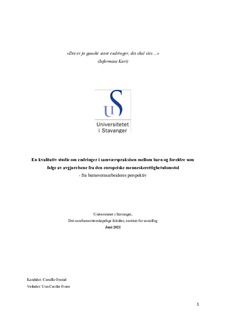| dc.contributor.advisor | Omre, Unn Cecilie. | |
| dc.contributor.author | Onstad, Camilla. | |
| dc.date.accessioned | 2021-09-14T16:26:24Z | |
| dc.date.available | 2021-09-14T16:26:24Z | |
| dc.date.issued | 2021 | |
| dc.identifier | no.uis:inspera:84056848:47153921 | |
| dc.identifier.uri | https://hdl.handle.net/11250/2776755 | |
| dc.description.abstract | Temaet for masteravhandlingen er hvordan de nye avgjørelsene fra den europeiske menneskerettighetsdomstol endrer samværspraksisen mellom barn og foreldre i det norske barnevernet. Denne studien har tatt utgangspunkt i seks kvalitative intervjuer med kontaktpersoner fra kommunale barneverntjenester, og er basert på en tematisk analyse. Studiens formål har vært å få mer kunnskap om hvilke endringer som oppstår rundt samværspraksisen i barnevernet.
Studiens funn har vist at informantene anser barnets medvirkning som svært viktig og at de involverer barn i vurderingen av samvær. Videre at barnets eget perspektiv kommer mer til syne ettersom barnet blir eldre, og har en større kapasitet til å ytre seg om sine meninger rundt samværsordningen. Informantene som fortalte om små barn, viste til de voksnes barneperspektiv av hva som er barnets behov og beskrivelser av dets atferd. Tidligere forskning har derimot vist til at barnevernet ikke har tilrettelagt godt nok for barnets medvirkning. En årsak til funnet kan være dersom barn og voksne har en ulik forståelse av hva medvirkning innebærer. Studiens funn har vist at fylkesnemnda kan ha en ulik beslutningsterskel enn barnevernet og at informantene opplever at nemnda kan vektlegge barnets medvirkning i for liten grad. Ved hjelp av barneperspektivet er det argumentert for at ulik tilnærming til barnets medvirkning kan ha en betydning for hvilken grad barnet involveres i beslutningene.
Videre har studien vist at det fastsettes mer samvær enn tidligere og at barnevernet må tilrettelegge bedre for samvær der det ikke fungerer optimalt. Ved hjelp av styrkeperspektivet er det argumentert for at økt veiledning kan bidra til å styrke familiens evne til å utvikle og endre seg. Det er videre argumentert for at samvær skal vurderes konkret for den enkelte saken, og med utgangspunkt i å gjenforene barnet med deres biologiske foreldre. Samtidig skal en gjenforening ta utgangspunkt om det er til barnets beste. | |
| dc.description.abstract | The following master’s thesis explored how the new decisions from the European Court of Human Rights has changed how visitation rights between parents and their children are practiced in the Norwegian child care services. The study is based on six qualitative interviews with personnel from municipal child care services, and is based on a thematic analysis. The aim of the study was to increase knowledge around visitation practices in Norwegian child care services.
The participants in the study reported that involving the child in the processes around visitation rights is important. Also, children´s perspectives were reported as more evident as the children grow older. This was associated with increased capacity to express their own opinions around the visitation practice. Those working with younger children reported that decisions were based on the adult perspective of children´s needs and behaviour. However, research has shown that the child services have not managed to allow sufficient child complicity. This may be caused by children and adults having different perceptions of what complicity involves. Moreover, the county board may have a different decision threshold than the child services, where participants in the study reported an experience of the county board valuing the children´s complicity insufficiently. The following study implemented the child perspective to argued that different approaches to children´s complicity may influence what level of involvement the child has in decisions around visitation.
Secondary findings in the study showed that visitation rights are planned to a greater extent in present day, and that the child services should aid in improving visitation practices where these are not optimal. By applying the strength perspective, it has been argued that increased guidance and supervision may strengthen the family’s ability to develop and change. Moreover, it is argued that visitation rights should be decided on a case-to-case basis, aiming to reunite the child with its biological parents. Nonetheless, when evaluating appropriateness of reuniting the family, the child´s best interest should be considered. | |
| dc.language | nob | |
| dc.publisher | uis | |
| dc.title | En kvalitativ studie om endringer i samværspraksisen mellom barn og foreldre som følge av avgjørelsene fra den europeiske menneskerettighetsdomstol. | |
| dc.type | Master thesis | |
